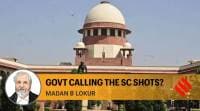
Madan B Lokur
The writer retired as a justice of the Supreme Court of India in December 2018.
Authors you can follow
More From Madan B Lokur

By standing up for stray animals, India can show the world a better way
January 05,2026 16:41:40 PM
The Supreme Court's motivation to balance public safety and animal welfare cannot be faulted. The pathway to hell, however, is often paved with good intentions, and we point to three serious risks that could follow from the rulings
Mon, Jan 05, 2026
Why district court judges need research assistants like High Court and Supreme Court judgesSubscriber Only
December 22,2024 16:18:27 PM
With extremely high caseloads, most district court judges have no time to prepare for fresh matters which requires reviewing documents. High caseloads leave them with only non-ideal choices, adjournments, and hasty orders passed with inadequate application of judicial mind.
Sun, Dec 22, 2024
A question for the collegium: Why was Justice S Muralidhar not brought to the Supreme Court?Subscriber Only
August 16,2023 07:35:06 AM
The collegium needs to explain its decision, considering Muralidhar’s exemplary record as a judge and legal scholar.
Sat, Aug 19, 2023
Centre’s Delhi Ordinance disregards constitutional morality. Ambedkar and SC concurSubscriber Only
June 28,2023 07:21:46 AM
Given the sweep of the Ordinance, it is quite clear that the intent and purpose is to overturn the unanimous judgment of the Constitution Bench of the Supreme Court. The Ordinance comes out as a constitutional fraud on the people of Delhi, its elected representatives and the Constitution
Wed, Jun 28, 2023
Distinction between free speech, sedition is being lost sight of by establishmentSubscriber Only
October 14,2020 03:09:00 AM
Madan B Lokur writes: It is time for the establishment to realise that the people of this country mean well, and in any democracy, there are bound to be different points of view.
Wed, Oct 14, 2020
Social distancing is here to stay, will profoundly change the way in which justice is deliveredSubscriber Only
May 08,2020 01:00:04 AM
Post lockdown, justice delivery will certainly undergo a transformation and judges, lawyers and litigants will need to adapt to the new normal.
Fri, May 08, 2020
Courts must intervene to address violations of children’s rights in UP, J&KSubscriber Only
March 10,2020 04:25:41 AM
We need to develop an accountability jurisprudence. The establishment must be as (if not more) accountable as protestors who destroy public property.
Tue, Mar 10, 2020
Encounters, like the one in Telangana, call attention to a criminal justice system in need of urgent reformSubscriber Only
December 11,2019 03:52:35 AM
What do encounters achieve other than the death of fellow humans masquerading as instant justice? The trigger-happy personnel of the security forces may be prosecuted but will they ever be punished? It’s unlikely because of the time lag.
Wed, Dec 11, 2019
Collegium’s actions show that the NJAC which was struck down four years ago is back, with a vengeanceSubscriber Only
October 16,2019 00:22:23 AM
It seems to me that the unconstitutional NJAC is rearing its head and is now Frankenstein’s monster. The advice of the two eminent persons postulated by the NJAC is no longer required.
Wed, Oct 16, 2019
It is time to identify causes of delays in our justice delivery system and provide meaningful solutionsSubscriber Only
August 21,2019 00:32:27 AM
Case and court management are the most important areas which, unfortunately, have not been adverted to in the Economic Surveys. The Ease of Doing Business Report of the World Bank for 2018 and 2019 shows that the time taken to decide a case has remained static at 1,445 days. Why is that?
Wed, Aug 21, 2019
A one-sided justiceSubscriber Only
May 22,2019 00:05:11 AM
The complainant in the sexual harassment case against the Chief Justice has not been fairly treated. Institutional bias is visible in the inquiry, which leaves complaints about victimisation unaddressed.
Wed, May 22, 2019a better experience





